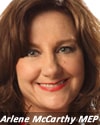Proposals by the European Parliament to limit the scope of the organised trading facility (OTF) have been bolstered by MEPs leading the European Parliament’s review of the Market Abuse Directive (MAD).
Arlene McCarthy MEP, the lead politician for the Parliament’s Economic and Monetary Affairs Committee’s review of MAD, said increased fragmentation would make it harder to detect market manipulation.
Presenting her amendments to MAD to MEPs, McCarthy added that she had broad support from her colleagues for her desire to remove the OTF category from the European Commission’s MiFID II proposals.
The Commission introduced the OTF in its October draft of MiFID II as a new classification of trading venue that would capture broker crossing networks, currently classified as OTC trading under MiFID I, and new markets that are likely to emerge in response to impending OTC derivatives legislation.
However, MEPs’ separate amendments to MiFID II, led by Markus Ferber, suggested limiting the OTF category to non-equities only. Ferber explained that BCNs could be recategorised into MiFID’s existing venue types – regulated markets, multilateral trading facilities or systematic internalisers.
During MAD discussions, MEPs said the OTF category was not well enough defined and would enable yet another type of player to enter a market that is already complex and hard to control.
"We need to be very tough on market abuse and market manipulation. Our purpose is to improve and clarify", said McCarthy.
Coordination between the MEP committees that are each responsible for guiding MAD and MiFID II is growing. As well as broad agreement on OTFs, McCarthy’s MAD amendments also included order-to-trade ratios for all trading venues and asked for a deeper investigation into high-frequency trading, shortly after the MEPs’ MiFID amendments that seek to curb the practice.
